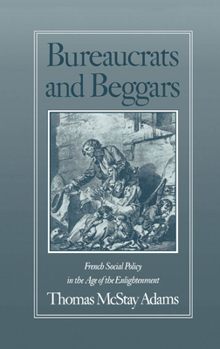Bureaucrats and Beggars: French Social Policy in the Age of the Enlightenment
Select Format
Select Condition 
Book Overview
In the mid-eighteenth century in France, the royal authorities launched a new campaign to sweep beggars from the streets, pinning their hopes on the creation of a uniform royal network of lock-ups in which anyone found begging might be detained. In this study, Adams probes the accomplishments and the failings of these so-called d p ts de mendicit , as seen by critics of the experiment (including learned judges and influential spokesmen of the provincial Estates) and as seen by those responsible for its success: the provincial intendants, the royal engineers, the doctors, the inspectors, the contractors, and various givers of advice. He shows how the debate--both internal and external--over the operation of the d p ts contributed to the intellectual ferment of the Enlightenment and the Revolution. The resulting web of reasoning and empirical data gave support to Montesquieu's principle that the state owes every one of its citizens "a secure subsistence, suitable food and clothing, and a manner of life that is not contrary to good health."
Format:Hardcover
Language:English
ISBN:0195051688
ISBN13:9780195051681
Release Date:January 1991
Publisher:Oxford University Press
Length:416 Pages
Weight:1.70 lbs.
Dimensions:1.2" x 6.4" x 9.2"
Customer Reviews
1 rating
An Exceptional, Learned Investigation
Published by Thriftbooks.com User , 20 years ago
An exceptional investigation by an obviously wise and learned scholar. I hope one day to study with Professor Adams at a university. What a marvelously researched and fluently written book!





